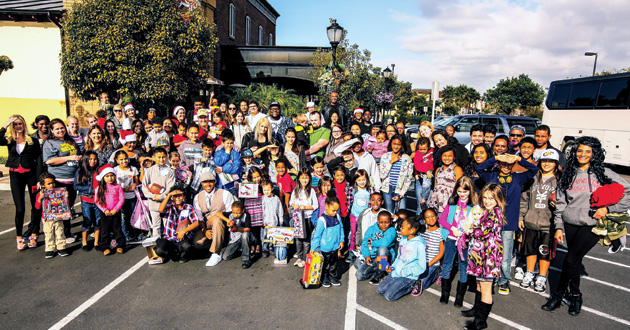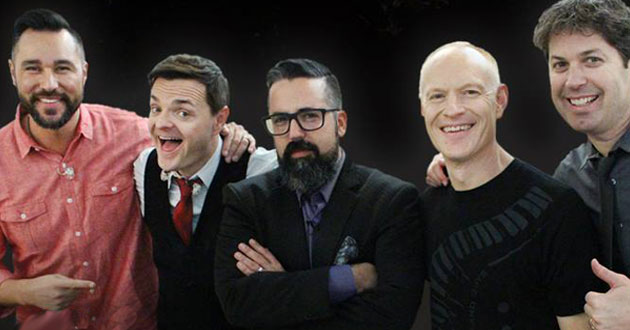Musician’s charity work strikes a chord with kids

Lamar Lacañgan had just come off of a multi-year tour with his singing group, Kindred Three, and time became his new companion.
“I chose not to re-sign my deal,” he said. “After that I was, ‘OK, now what? What have you got for me Lord?’”
Looking to stay busy, he took a friend up on an invitation to hang out with some kids living in a group home setting. Soon he became a regular visitor.
His friend thought it would be cool for the youth to meet someone who has toured.
“It was interesting to me,” Lacangan said, “because I had never been in that type of environment before. Although I was familiar with the behaviors.”
One of the first kids he met was a girl named Ashley. She spurned his attempts to get acquainted.
“She was raised to hate men, she was raised to hate African-Americans and raised to hate Christians, so that was three strikes against me immediately,” he said. “She never talked to me, ever. I might have got an ‘Umph, umph’ and grunts out of her.”
Since she wouldn’t interact, he simply observed.
“She would be isolated, always writing. I said, ‘OK, that’s an interesting little note.’”
That discovery prompted him to pay closer attention the behaviors of others at the facility.
“There was one kid, every time you saw him he was tapping on the table,” he said, rapping the table like it was a drum kit. “It was annoying to most people. He was always tapping his foot or something. Then there was a girl that every song that came on the radio she would just sing her heart out. Out of key. Out of tune.”
Without any planning on his part, these quirks endeared them to his heart.
“Over a year’s time I really became fond of these kids,” he said.
Shining the light
Ashley was still mostly unresponsive, though, until Lacañgan asked her about the contents of her notebook.
“She takes her notepad and kind of shoves it over to me, slides it over on the table and says, ‘Umph,’” he said. “It was a poem about her life. It was about all the things in her life she wished she could change. So a light bulb goes off. The Lord kind of said, ‘This is why you are here.’”
Lacañgan, who at this point was professionally pursing a solo career under the name of Marz Jukebox, broached a proposal.
I said, ‘Ashley, what if I show you how to take your poem and put it in a song format, like songwriters?’ She went, ‘What? No one has said that to me before.’ I said, ‘I know I’ve never said that to anyone.’”
Noticing he had piqued her interest, Lacañgan took it a step farther.
“Then I said, ‘What if I got the girl that was singing out of key all day and I showed her how to sing your lyrics?’ And she went, ‘Huh?’ ‘And then the kid tapping on the table, what if I show him how to make the music for it and I take you to the recording studio and you recorded it?’ Instantly, all their walls came down.”
He worked with each of them, eventually getting them into a studio where they were able to cut a CD with their song.
“They all hated each other,” Lacañgan said. “They were from different gangs, different upbringings, different cultures. The song ended up getting downloaded all over the world to help the next group of kids. It started out like that and became the ‘I am Hope’ project.”
“We take them from nothing. We teach them how to write not just the lyrics, but write the music. Then I take them into the studio and then we record. The whole process is based on how quickly they learn.”
Paying it forward
In addition to mentoring and music training, I am Hope co-hosts an annual Christmas party that draws as many as 400 children who are regaled with breakfast, toys, and visits from former Olympians and NFL and NBA players. Recent additions to the event, which just celebrated eight years, included donated buses to transport families and an inquiry by a local theme park to provide free tickets.
“I’m like, ‘Whoa!’” he said. “I just showed up. I cannot take credit for anything. It’s all God’s doing. The message and vision for I am Hope is not that I am the hope, but you are the hope. Ultimately, God is the hope, but in your world, you are the inspiration. God can use a person and that’s what we instill in kids.”
That work is not limited to North County. In fact, Lacañgan’s traveled to Uganda several times reaching about 1,200 children and teens living in orphanages.
“We went from village to village, all over Africa,” Lacañgan said. “Some of these places you would literally open the bushes and there they were in huts. It was very humbling.”
The trips were designed, he said, to inspire young people to take charge of their own destinies by first relying on a sovereign God.
“When we are in Africa, they are looking at us like, ‘You are from America. Oh, you guys are here to save us.’ I’m like, ‘I’m not here to save you.’ They are like, ‘What?’
“They are looking for a handout,” he said. “They see Americans as rich and we can solve all their problems, but I’m trying to tell them that you can solve all your problems.”
To help them on that path, I am Hope delivered native-language Bibles to pastors living in Rakai, an area known as the birthplace of AIDS and where voodoo is a common practice.
“The whole place broke out like you would have thought it was the Super Bowl,” he said. “They were crying. Some of them all they had was maybe a half a page of the Bible and whatever that Scripture was, that’s what they preached from. We got to bless them with music and the Word.”




